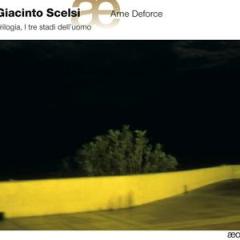Giacinto Scelsi - Trilogia, I Tre Stadi dell'Uomo (2006)
Giacinto Scelsi - Trilogia, I Tre Stadi dell'Uomo (2006)

01. Triphon[1956],I-Jeunesse [0:06:12.00] 02. Triphon[1956],II-Energie [0:03:53.00] 03. Triphon[1956],III-Drame [0:05:12.00] 04. Dithome[1956-57]-Maturite-Energie-Pensee [0:17:17.00] 05. Ygghur[1965],I-Viellesse [0:08:15.00] 06. Ygghur[1965],II-Souvenirs [0:04:21.00] 07. Ygghur[1965],III-Catharsis-Liberation [0:06:00.00] Arne Deforce – cello [01,03] with special metallic sourdine
A truly singular figure in the realm of classical music, Giacinto Scelsi lived most of his creative life nearly completely invisible to the musical world. When his extraordinary oeuvre was properly discovered in the mid-eighties, he was already eighty years old; he died in 1988 mere months after a triumphant, well-received series of premieres of his large orchestral works, some of which had awaited performance for a quarter of a century.
Giacinto Scelsi was born in 1905 into an aristocratic family and was always wealthy enough to allow him to pursue his musical interests full-time. Besides being a virtuoso pianist, he also studied composition, getting acquainted with the ideas of Scriabin and the so-called second Viennese school. His compositional style was up-to-date and modernistic -- he was the first Italian to research and utilize the twelve-tone system, a decade before Luigi Dallapiccola -- until the mid-fourties, producing a large body of chamber pieces, in particular for solo piano.
A mental breakdown brought Scelsi's career came to a halt toward the late fourties. He sought refuge in poetry, Theosophy and oriental mysticism and meditation, traveling extensively in Nepal and India. By the time he resumed composing in 1952, his style had started to undergo a complete transformation, seemingly breaking entirely free of (but not abandoning) the western musical mold, and it was with the works of the 20 years that followed that he eventually gained his place amongst the greatest composers of the 20th century.
The music of Scelsi's mature period is characterized by an intense, meditative concentration on the sonorities of single notes, elaborated by microtonal shadings, timbral variation and ingenious polyphonic expansions; explicit rhythms are often absent, replaced by slowly evolving pulses reminiscent of the rhythm of breathing. A prime example is the Quattro pezzi su una nota sola ("four pieces on a single note") of 1959: one of Scelsi's few orchestral works to be performed soon after its composition (and one of the few to attract any manner of contemporary publicity), its four pieces each concentrate on just one note (F, B, Ab and A respectively) with an end result that is neither monotonic nor minimalistic, but iridescent, monolithic and intense.
Scelsi was most prolific in the realm of solo music, producing over his career amongst other things fourty preludes and eleven suites for piano and a vast amount of short pieces for wind instruments and strings. The many sketchlike pieces of the fifties served as preparations for the body of orchestral works that he would create in the sixties (of which the Quattro pezzi mentioned earlier was the first) and for which he is most famous, and for the string ensemble music which runs as an important vein throughout Scelsi's oeuvre. His five string quartets span the entire range of his stylistic stages of development, from the crisply modern 1944 first quartet to the startlingly austere fifth quartet of 1985 (one of his last works) and as a body contain some of his most intimate music; through the sixties he also wrote a series of works, partially drawing on the material of the quartets, for larger string ensembles.
Scelsi's orchestral phase, which yielded a total of seven works for large orchestra (with and without choir) and approximately as many for chamber-size ensembles, peaked in complexity with the violent Uaxuctum (for orchestra, choir, vocal soloists and ondes martenot, 1966); after the majestic Konx-Om-Pax (for orchestra and choir, 1969) he withdrew from large-scale projects - nearly nothing of them had been performed anyway.
In the seventies Scelsi started to gain some recognition amongst musicians and other composers. He was sought for collaborations and commissions by esteemed instrumentalists, such as Frances-Marie Uitti, Marianne Schröder and Joëlle Léandre. His compositions of this era tended to a kind of distilled austerity, and were for the most part written for one or two instruments. After 1976 he composed little new material, but his fame has been steadily if slowly growing.
Shortly after Scelsi's death in 1988 his output was surrounded by a rather unusual controversy arising from his peculiar composition method. In the early fifties Scelsi, dissatisfied with the insufficiency of his formerly favored piano's twelve notes to the octave to produce the sounds he wanted, began using the Ondioline, an electronic keyboard instrument capable of microtonal output. He would compose by improvising passages to magnetic tape and transcribe and orchestrate it afterwards, either in person or by his assistant under his guidance. One Vieri Tosatti, who had worked as Scelsi's assistant for the last ten years of his life, said in an interview that he had written Scelsi's music during those years. This allegation turned out be highly implausible: Scelsi had had numerous assistants over the years, yet his style hadn't changed accordingly; Tosatti's own music was characterized by Frances-Marie Uitti as "conservatively Wagnerian"; finally, Tosatti himself later refused to discuss his claim further at all. --- rateyourmusic.com
download: uploaded anonfiles mega 4shared mixturecloud yandex mediafire ziddu








